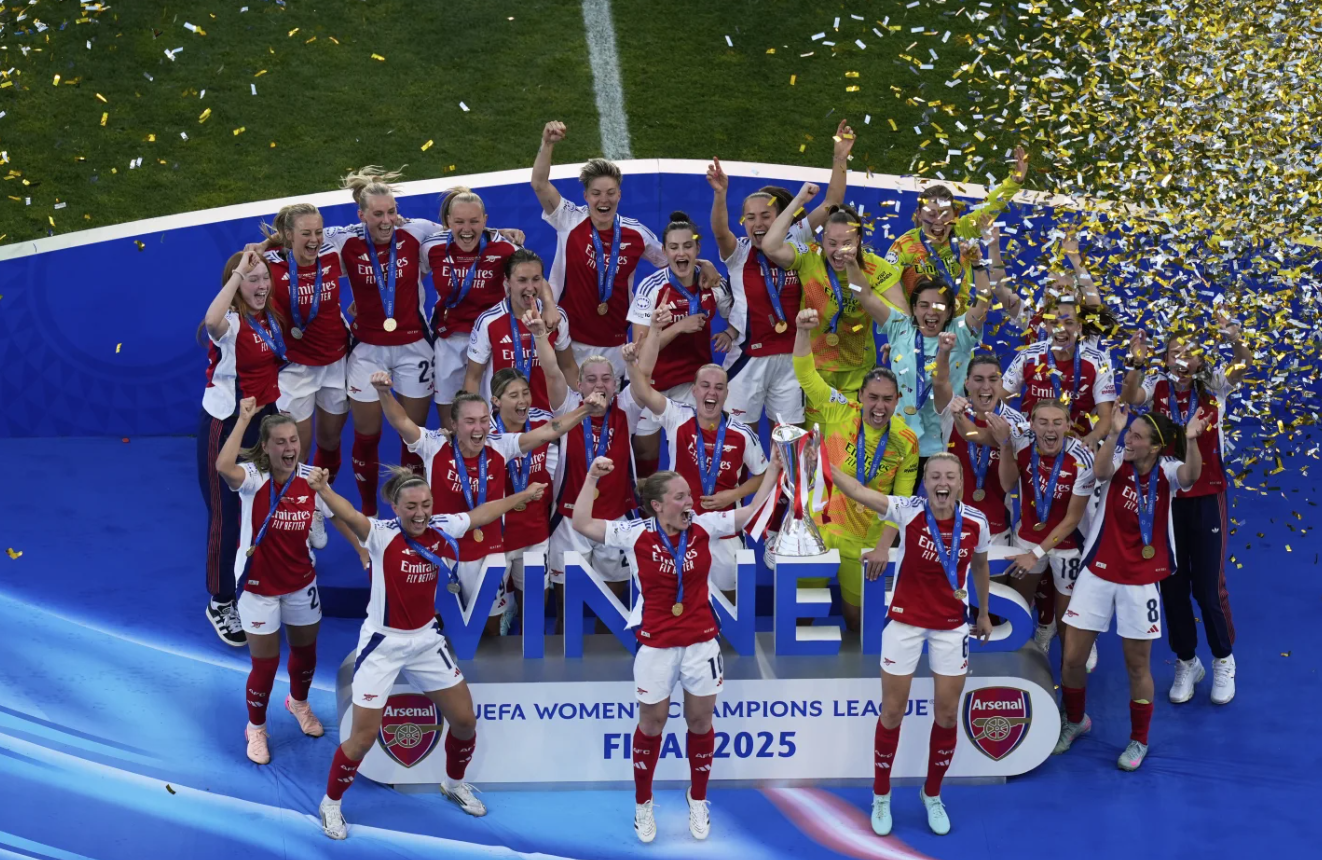Arsenal stunned reigning champions Barcelona 1-0 in the UEFA Women’s Champions League final on Saturday, with Stina Blackstenius scoring the winner to secure the club’s second European title.

LISBON, Portugal (WE) — Red-and-white streamers exploded into the air at Estádio José Alvalade as Arsenal lifted its second UEFA Women’s Champions League trophy, stunning defending champion FC Barcelona 1-0 on Saturday.
A late goal in the 75th minute by Stina Blackstenius, assisted by fellow substitute Beth Mead, sealed the shock result. Arsenal’s disciplined defense shut down one of the most feared attacking teams in Europe.
The Gunners’ victory came 18 years after they became the first—and still only—English club to win Europe’s top prize in women’s soccer. At the final whistle, Arsenal players rushed toward their supporters, celebrating a moment that few thought possible.
“We had to be basically perfect to beat Barcelona,” said Kim Little, Arsenal’s captain. “Our players who came on today had an incredible impact.”
Little and Leah Williamson raised the trophy together as confetti and glitter rained down from the stadium ceiling. Former Barcelona forward Mariona Caldentey, now wearing Arsenal red, consoled her old teammate Aitana Bonmatí before she stepped up to collect her fourth Champions League runner-up medal.
Barcelona entered the match as the clear favorite. The Catalan powerhouse was chasing a fourth title in five years and aiming to become the second club after Lyon to win three consecutive trophies. Led by Ballon d’Or winners Bonmatí and Alexia Putellas, they had cruised through the knockout rounds with dominant wins over Wolfsburg and Chelsea.
But in Lisbon, Arsenal had the edge.
Aside from a brief Barcelona surge early in the second half, Arsenal’s defense was nearly flawless. The North London club created the better chances. Barcelona goalkeeper Cata Coll kept her side in the game with two excellent saves—one on Frida Maanum and another on Blackstenius.
But when Mead slipped a pass through the defense to Blackstenius, Coll couldn’t stop the Swede’s strike.
It was a landmark moment in a dramatic season for Arsenal. The team overcame mid-season turmoil when manager Jonas Eidevall resigned unexpectedly. Assistant coach Renée Seglers stepped in and quickly transformed Arsenal into one of Europe’s most resilient teams.
Under Seglers, Arsenal clawed their way through dramatic victories over Real Madrid and Lyon. Their confidence grew with each round, culminating in a defensive masterclass against the tournament’s highest-scoring side.
“What we did so well was using all possible tools to speed the game up, to disrupt it, but to stay true to who we are,” Seglers said. “This was key to why we won today. Barcelona are so good, but we tried to exploit weaknesses where we could. We said beforehand that the midfield of Barcelona was the engine. So we wanted to stop them.”
Alessia Russo led Arsenal’s frontline with grit. Her hold-up play frustrated Barcelona and allowed her teammates to advance in support.
“We respect them, but we can’t give them too much respect either,” said Katie McCabe. “We needed to put pressure on them, and we know we’re a good pressing team. Our frontline and the midfield really worked their socks off today.”
Barcelona’s performance left their fans heartbroken. More than 15,000 Barcelona supporters filled the stadium—outnumbering Arsenal’s fanbase—but their chants of “Yes we can!” were not enough to spark a comeback.
Read More:
- 2025 NBA Western Conference Finals Game 2 Preview: Thunder vs. Timberwolves
- Scottie Scheffler Wins PGA Championship for Third Major Title
- Knicks vs. Pacers Game 1: A Classic Clash of Styles Kicks Off the Eastern Conference Finals
The best chance for Barcelona came just after halftime. Claudia Pina unleashed a powerful shot that struck the crossbar. It was a close call, but it was also the last serious threat the Spanish side posed.
Bonmatí, as always, was Barcelona’s brightest light. Her bursts through midfield forced Arsenal to stay alert. But even her best chance was blocked by Williamson inside the box in the 12th minute.
“I feel sadness and frustration for our fans,” Bonmatí said. “I love this club’s colors as much as they do. They travelled here in their thousands to support us. I’m sorry we didn’t give them what we all wanted. But we’ll be back.”
Barcelona’s disappointment was clear, but Arsenal’s triumph was a story of redemption and belief.
Their campaign had many doubters. They struggled in the Women’s Super League and endured internal upheaval. But when it mattered most, they delivered. Not just with talent—but with grit, heart, and perfect timing.
Seglers’ tactical plan revolved around disruption and control. Arsenal slowed the tempo when needed, then attacked with pace and purpose. Her substitutions proved decisive, especially the link between Mead and Blackstenius.
It was Arsenal’s night—and one that will echo for years.
In the post-match press conference, Seglers credited the entire squad for the achievement. “We had so many setbacks, but this team never gave up,” she said. “Every player played her role. And today, they played it perfectly.”
Barcelona manager Jonatan Giráldez admitted his team wasn’t at its best. “We didn’t control the spaces well. Arsenal forced us into uncomfortable situations. And we couldn’t capitalize when we had momentum.”
For Arsenal fans, it was a night to remember. The club that made history in 2007 made history again in 2025.
Supporters lined the streets back in London as the celebrations began. On social media, tributes poured in from across the football world. Former players, legends, and even Premier League stars congratulated the women’s side for their milestone victory.
This result also reshapes the landscape of European women’s football. Barcelona had been dominant. Lyon has been historic. But Arsenal’s return to the summit signals a new era of competition—and belief.
Eighteen years later, Arsenal are champions of Europe once more. And this time, it feels like just the beginning.